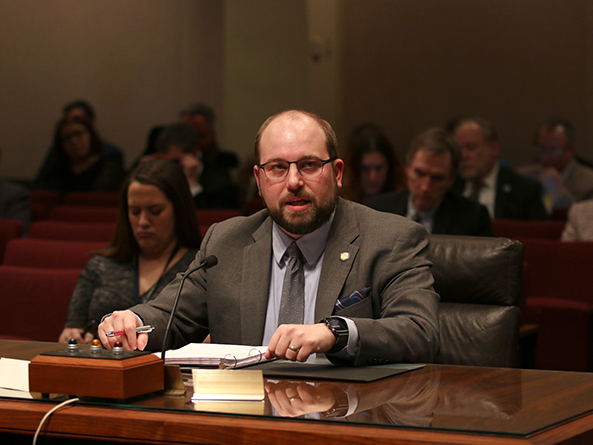More affordable housing sought
The Urban Affairs Committee heard testimony Feb. 4 on two bills designed to expand affordable housing options.

LB794, introduced by Lincoln Sen. Matt Hansen, would create the Missing Middle Housing Act. The bill would allow middle housing—defined as duplexes, triplexes, quadplexes, cottage clusters and townhouses—to be built in areas zoned for single-family dwellings in cities of the metropolitan, primary and first class.
Cities would be required to amend their zoning ordinances to comply with the bill by Jan. 1, 2022.
Single-family housing prices have risen by 41 percent in Omaha to 34 percent in Lincoln, Hansen said, and expanding the type of housing available would help lower costs.
“These units are the middle of the housing spectrum,” Hansen said. “Single-family homes are expensive to build, expensive to buy and expensive to maintain and this process is only getting worse as the size of the average single-family home has risen from 1,500 square feet in the [1970s] to 2,500 square feet today.”
Patrick Leahy, representing the Nebraska chapter of the American Association of Architects, testified in support of the bill. Increasing housing density provides more choices for low- and middle-income earners, he said.
“This is really about redefining multi-family housing with more options, providing a bridge between the single-family housing we have and those large, rising towers [of apartments],” Leahy said.
Ward Hoppe, speaking on behalf of the Metro Omaha Builders Association and the Nebraska State Home Builders Association, also spoke in favor of the bill. Multi-family housing reduces per-unit construction costs because infrastructure can be used by more than one home, he said.
“Mass means more affordability,” Hoppe said.
Lynn Rex of the League of Nebraska Municipalities testified against the bill, saying it undermines local control. Cities already are working on the issue of affordable housing, she said, and oppose additional mandates.
“We think this will have a backlash,” Rex said. “I think this will have unintended consequences.”
The committee also discussed LB1155, introduced by Omaha Sen. Tony Vargas, which would create the Middle Income Workforce Housing Investment Act. The bill would require the director of the Nebraska Department of Economic Development to establish a grant program to foster and support construction of housing affordable to first-time home buyers, middle-income earners and the emerging workforce in urban communities.
The newly created Middle Income Workforce Housing Investment Fund would receive a one-time $10 million transfer from the state’s General Fund.
Under the bill, nonprofit organizations could apply for grants to construct or rehabilitate housing in neighborhoods with a demonstrated need for affordable housing or a substantial number of dilapidated homes.
Grants would be available in counties with a population of more than 100,000 and would require one-to-one matching funds.
Vargas said he introduced the bill because of a shortage of affordable owner-occupied homes in Douglas, Sarpy and Lancaster counties.
“In my district specifically, there has been a lot of new construction of higher-end condos and higher-priced rental units. While the investment in neighborhoods has been positive in many ways, it has also resulted in longtime residents being pushed out,” Vargas said.
Matthew Cavanaugh, executive director of the Nebraska Housing Developers Association, supported the bill. Virtually no city in the state has adequate affordable housing to meet demand, he said.
“By investing more funding into housing development, the Middle Income Workforce Housing Investment program is tailored narrowly enough to impact areas where the housing need is not being addressed by the market but still flexible enough that it will be highly competitive,” Cavanaugh said.
Christy Abraham of the League of Nebraska Municipalities also testified in support of LB1155. Affordable housing is perhaps the most important issue facing cities throughout Nebraska, she said.
No one testified against LB1155 and the committee took no immediate action on either bill.


